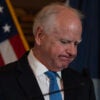Now that Obamacare passed, the Left is calling it a truly historic achievement, chalking it up as a victory for health care reformers everywhere. With the enactment of the House-Senate reconciliation bill, the so-called “fix” to the Senate bill, Speaker Nancy Pelosi (D-CA) remarked that the bill did “something very important for the American people, very significant to their daily lives.” Well, Congressional liberals are correct about one thing. It’s historic. It is an unprecedented takeover of Americans’ health care now equal to one-sixth of the entire US economy. It is historic for its partisan backroom deals and controversial parliamentary tactics. And it is historic for its apparent disregard for the strongly held opinion of the majority of the American people. But it will long be remembered for its catastrophic side effects- in record spending and its disruption- on the lives of millions of Americans.
Recent research by Heritage’s Kathryn Nix looks at some of the major consequences of Obamacare. The paper outlines the ten ways in which liberals’ health care agenda will be a disaster for Americans. They include:
- Growth in federal deficit
- Increased health care costs and spending
- Slowed economic growth through new taxes and mandates
- Augmented government control over health care
- Expansion of inefficient entitlement programs
- Higher burdens on state budgets
- Inadequate focus on Medicare
- Low income worker discrimination
- Social and economic inequities in the exchange
- Blatant disregard for federalism and the US Constitution
Only two weeks after passage of the bill, some of these effects are already evident. Large corporations and small businesses alike have gone public with the new costs they will face as a result of new law. Caterpillar, Inc. expects a $100 million dollar hit to earnings from the subsidy tax on retiree drug benefits. John Deere & Co., the world’s largest maker of farm machinery, said the new law will increase expenses by about $150 million after taxes in the fiscal year that runs through October. In all, health care charges ultimately may shave as much as $14 billion from U.S. corporate profits, according to an estimate by benefits consultancy Towers Watson. This will negatively affect job growth and curb investment in the US economy.
States also have already begun to feel significant financial pressure as well as a loss of control over state health programs. Congress’s Medicaid expansion, opposed by many Governors, has prompted Indiana governor Mitch Daniels to drop his popular Healthy Indiana Program, a program providing insurance to 50,000 low income Indiana residents. Gov. Daniels remarks, “I hope those folks will do all right when they are pitched into Medicaid.” Gov. Daniels, like many others, is being handcuffed by Washington. He is being ordered to expand inefficient federal entitlements at the expense of custom state-based programs—a major hit to federalism and state rights.
As Nix concludes in her analysis:
These disasters are only the beginning of the vast effects the President’s health care overhaul will have on the U.S. As bits and pieces of the law are implemented, its effects on states, businesses, and Americans of every ilk will become manifest. Congress and the American people should not view passage of the liberals’ health care package as the end of the debate on reform. Rather, the long and tedious journey toward restoring personal control over health care dollars and decisions is just beginning.
The battle has just begun.
Rick Sherwood currently is a member of the Young Leaders Program at the Heritage Foundation. For more information on interning at Heritage, please visit: http://www.heritage.org/About/Internships-Young-Leaders/The-Heritage-Foundation-Internship-Program
































2 Replies to “Obamacare Spells Disaster for Americans”